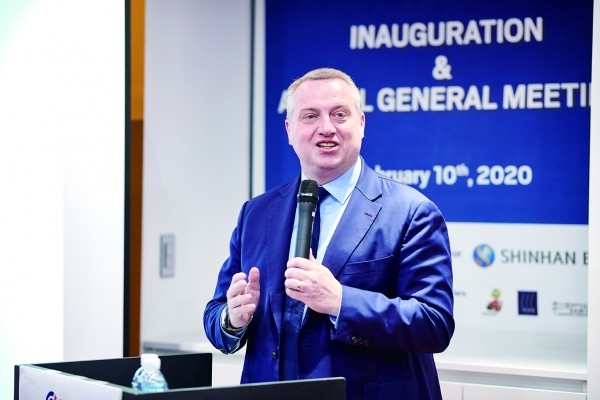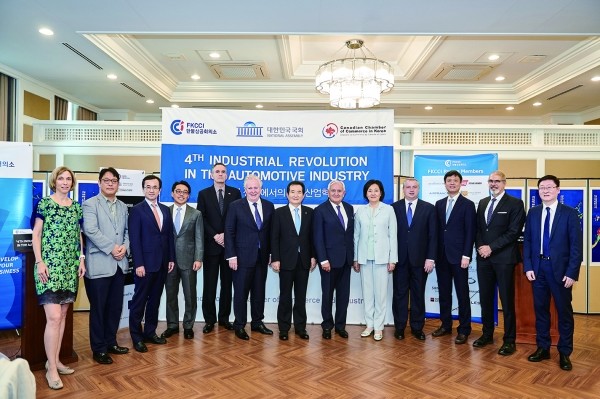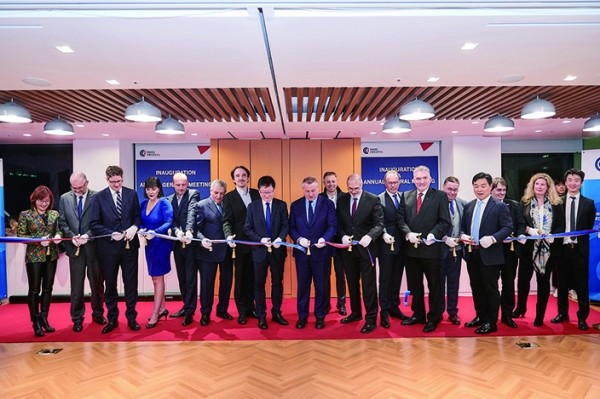On Bastille Day of France

FKCCI’s Chairman, David Pierre Jalicon stressed on the bilateral economic cooperation between France and Korea.
Please introduce the significance of your Bastille Day, June 14th and brief history of FKCCI for our readers.
Bastille Day is the France’s national day, which commemorates the anniversary of the storming of the Bastille on July 14, 1789, a turning point in the French Revolution, as well as the Fête de la Fédération, a celebration of national unity that began July 14, 1790.
Since 1986, the French-Korean chamber of Commerce and Industry is the key player of the French- Korean business community through its powerful business network. We help French companies in their approach of the Korean market and their settlement. On the other hand, we also support Korean companies in their approach of the French market.
To do so, we provide a wide range business support services to provide expertise and networking opportunities. Early 2020, we moved to brand new premises in the heart of Gangnam to extend our business center where we host and incubate SMEs. Through these new premises, we founded what I call “La Maison” of the French-Korean business community. That is to say the beating heart of the community where we host events, welcome our members and create new contents through our media center.
Throughout the years, our network extended as French economic presence strengthened on the Peninsula. Over the years, and especially since the 60s, France emerged as an increasingly important actor in Korea’s economic landscape, that can be summarized in 4 steps:
- the establishment of large French groups such as Airfrance, Airbus or Alstom in the 60s-80s to develop infrastructures
- the diversification of French presence in the 90s, especially in consumption goods, as Korea started to get more opened and was in the spotlight due to the 1988 Olympic games
- From the end of the 90s and the 2000, Korea was seen more as a partner: solid M&As and joint-ventures were formed such as Renault-Samsung, Shinhan BNP Paribas, ….
- After 2010, we are in the era of partnerships and SMEs triggered by the 2011 EU-KR FTA.
From 200 members in 2011, the FKCCI jumped up to 375 members today and widened its network with Korean institutions!
Please let us know the major issues discussed and agreed during the summit talks between Korean President, Moon Jae-in and French counterpart, Emmanuel Macron at Elysee Palace on October 15th, 2018.
In their joint declaration, the two presidents agreed to take the "Global French-Korean partnership for the 21st century" to a new level, on the basis of their common attachment to the values of democracy, to the defense of human rights, the rule of law and multilateralism. Indeed, France and Korea are like-minded middle-sized democracies and share a lot of common features, in the fields of culture especially.
On the business level, the two countries celebrated the dynamism of their trade and committed to strengthen their economic ties, by giving full effect to the EU-Korea FTA and by effectively implementing whole its provisions, in particular the chapter relating to sustainable development. The two countries agreed also to actively promote investment and the establishment of SMEs and start-ups, and to strengthen joint actions in third countries. In particular, the field of new technologies linked to the fourth industrial revolution was emphasized.
The two countries also decided to strengthen their cooperation in research and development (R&D) between the KIAT (Korean Institute for Advancement of Technology), Bpifrance (French Public Investment Bank), KISED (Korea Institute of Start-up and Entrepreneurship Development) and the SBC (Small and medium Business Corporation), and cooperation between innovative start- ups, SMEs and middle-sized companies.

Please explain French investment environments for Korean potential investors and any special favors to foreign investors.
Showing exceptional results in 2019, France was as at the end of the year the most attractive country for foreign industrial investments in Europe.
Indeed, France has been the target of 1,468 investment decisions thus creating or maintaining about 40,000 jobs. These investments represented an increase of +11% and have contributed to a 30% increase in jobs generated in 2019.
A large domestic market, good quality of infrastructures and business environment, wide human talent pool, and strong R&D are cited by most foreign CEOs in France to define its main attractivity factors. External environment factors such as the Brexit have also played arole in the repatriation of investments from London to the Hexagon.
Overall, the USA remain the main contributor for the increase of foreign investments with 16.2%. In comparison, 20% of total investment come from North America and 11% from Asia.
In this context, Korean investors have an opportunity to take a greater role in this movement. The FKCCI operates an M&A service to help Korean investors find French partners in partnership with the Chamber of Commerce of Paris region which has a whole team dedicated to M&As. We believe that the post Covid-19 era will bring a lot of opportunities for mergers and acquisitions.
Please introduce some outstanding French companies' activities in Korea and vice versa.
France has 17 among the 200 largest companies in the world. There is 5,2 Bn€ French FDI stock in Korea, 8400 importers and exporters and 9,3 Bn€ worth of bilateral trade between the two countries. Major French companies in Korea are spread among a large spectrum of sectors including aeronautics & space (Airbus, Thales…), insurance (Axa), banking (BNP Paribas, Crédit Agricole CIB, Société Générale…), Automobile (RSM, Michelin, …), chemicals (Arkema), energy (Orano, Hanwha Total, Air Liquide…), transport (Air France, Bolloré Logistics…), luxury (Chanel, Dior, LVMH, Cartier, Hermes…), pharma (Sanofi, Guerbet…), and so on…
As said earlier, the establishment of large French groups such as Airfrance, Airbus or Alstom started in the 60s-80s to develop infrastructures. At that time, Korea started developing at a rapid pace and needed strong partners to develop its projects. Companies like Air France and Alstom are iconic as, the former was the first one to establish an office locally in 1964, and the second built the KTX line in 1993. From the end of the 90s and the 2000, solid M&As and joint-ventures were formed such as Renault-Samsung.
Now, outstanding companies include more and more innovation-oriented start-ups and SMEs with high-value added technology, which find synergy with high-tech Korean companies and can test products in the reactive local market. For example, Asiance, a digital marketing agency co-founded by a French and a Korea won several years in a row awards on digital marketing and now are expanding in Japan. Another example is in 2019, the company nr2 was the first French company to win the K-Startup Grand Challenge, by developing a web platform using AI to analyze data and detect promising innovations in Asia
To develop the knowledge of French economic presence in Korea, the FKCCI has developed in 2015 a web platform dubbed “FranceInKoreaXXI” (https://www.franceinkorea21.com/) with an interactive map which helps visualize French companies established locally: https://www.google.com/maps/d/u/0/viewer?mid=1hvSE7qb8- A4kE2mOuxCytZDWhOE&ll=37.565007621310855%2C127.00772808266447&z=17

Please let us know your point of view on how to strengthen further the close economic ties between Korea and France in order to expand trade and investment opportunities in the years to come.
The context is favorable as France and Korea are like-minded countries: both are middle-sized democracies with strong economies focused on innovation. A new momentum for strengthening ties arises from the Covid-19 crisis especially. We live in a world with more and more uncertainties, where multilateralism is at risk and global governance is deeply shaken. Nationalism, especially in economic sectors, is the bottom line of major world powers such as the US and China. In this context, France and Korea would benefit from stepping up on the global arena and partnering up with middle-sized powers, while capitalizing on the long- lasting friendship between the two countries. Emmanuel Macron and Moon Jae-In shared such ideas when they had their phone call last March. For example, the countries can find opportunities and synergies in the health and biotechnology sectors.
These ideas were highlighted during the last web conference organized by FKCCI on the post-Covid-19 world where we had the honor to welcome high-level economic and political figures from France and Korea: Mr. Jacques ATTALI, Former Advisor of the French President, world renowned economist and writer, and Ms. KIM Yeon-Hee, Managing Director of BCG Korea, Mr. Jean-Pierre RAFFARIN, Former French Prime Minister, Mr. KIM Gunn, Vice-Minister of the Korean Ministry of Foreign Affairs, and H.E. Mr Philippe LEFORT, French Ambassador to Korea.
To further strengthen bilateral ties, several barriers to trade and foreign investors in Korea could be eased. I am thinking about the complexity of certification process in Korea and their equivalence with international standards, the excessive fast pace of reforms which does not let enough time to companies to adapt, and the fair treatment between foreign investors and Korean companies (in bidding processes for example). Indeed, we never recall enough that foreign investors are fully part of the local economy: French companies represent 25,000 job creations in Korea.

